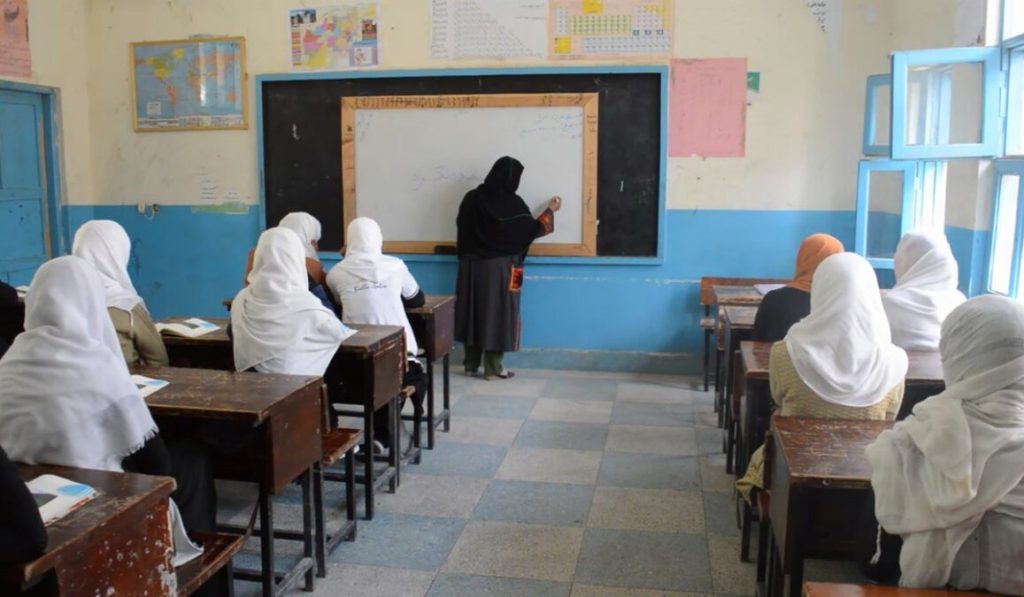NEW YORK: The Afghan Taliban have “nearly erased over two decades of educational progress” in Afghanistan, jeopardizing the future of an entire generation, according to UNESCO, the UN’s educational, scientific, and cultural agency. Afghanistan is now the only country in the world where secondary and higher education is strictly prohibited for women and girls over the age of 12, the agency reported.
The Taliban regained power on August 15, 2021, and quickly began to curtail women’s rights. Three years after the fall of Kabul, approximately 1.4 million girls have been “deliberately” denied access to education due to these restrictions.
In addition to the girls who were already out of school before the Taliban reintroduced strict religious laws, around 2.5 million girls in Afghanistan are now deprived of their right to education, representing about 80% of Afghan girls of school age. UNESCO also reported that university enrollment has declined by more than half since 2021.
This situation will likely lead to a shortage of graduates qualified for highly skilled jobs, exacerbating Afghanistan’s development challenges. While girls’ education is technically permitted up to the age of 12, the number of girls enrolled in primary education has dropped sharply since 2021.
UNESCO’s data shows that in 2022, Afghanistan had only 5.7 million children, both girls and boys, in primary school, down from 6.8 million in 2019. This decline is attributed to the Taliban’s decision to prevent female teachers from teaching boys, worsening the existing teacher shortage. Additionally, many parents are increasingly reluctant to send their children to school due to the worsening socioeconomic situation. There are also concerns that the rising dropout rate could lead to an increase in child labor and early marriages.
Since 2021, UNESCO has launched programs in 20 of Afghanistan’s 34 provinces, with the support of local communities. Over 1,000 facilitators, including 780 women, have been trained to deliver literacy courses, benefiting more than 55,000 young people, most of whom are girls.
UNESCO is also investing in distance learning through television and radio, providing financial support and training to Afghan media outlets that develop and broadcast educational programs. The UN agency continues to urge the international community to fully commit to restoring the right to education for girls and women in Afghanistan, emphasizing that in-person classroom education is the most effective way for people to learn.
“The right to education cannot be compromised or negotiated. The world must remain fully mobilized to secure the unconditional reopening of schools and universities to Afghan women,” stressed Audrey Azoulay, Director-General of UNESCO.
Meanwhile, 36 UN experts have issued a joint statement urging the international community not to normalize the Taliban regime in Afghanistan. These rights experts, who report to the Human Rights Council and are not UN staff, include Richard Bennett, the Special Rapporteur on the situation of human rights in Afghanistan.
“Over the past three years, the people of Afghanistan, particularly women and girls, have faced an escalating and appalling assault on their rights and freedoms by a regime that lacks legitimacy and inclusivity, suppresses all forms of dissent, represses civil society and the media, and shows blatant disregard for the principles of justice, equality, non-discrimination, and the rule of law,” the experts stated.
They further highlighted that the systematic and widespread subjugation of girls and women has reached a level that constitutes crimes against humanity, including gender oppression.
The situation is so dire that many in Afghanistan describe it as “gender apartheid.” The experts emphasized, “The people of Afghanistan deserve to live in a country where the rights, dignity, and humanity of all are respected and protected. Now more than ever, robust global action is needed to meet their demands with increased support, protection, and solidarity.”


